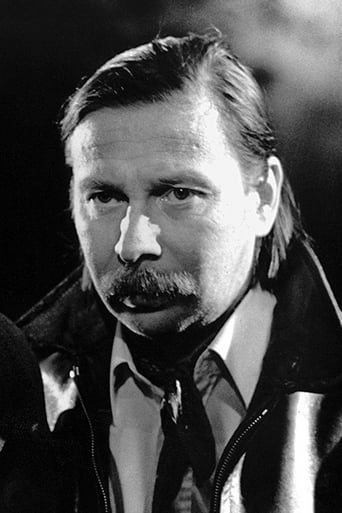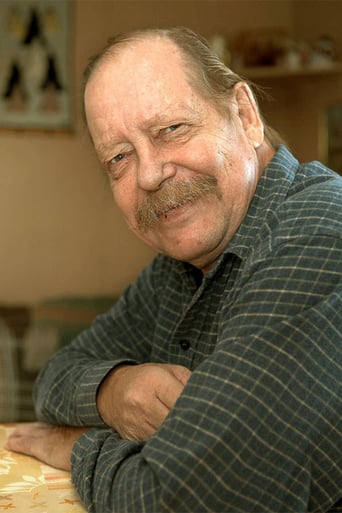Softwing
Most undeservingly overhyped movie of all time??
Majorthebys
Charming and brutal
Plustown
A lot of perfectly good film show their cards early, establish a unique premise and let the audience explore a topic at a leisurely pace, without much in terms of surprise. this film is not one of those films.
Cristal
The movie really just wants to entertain people.
huggibear
Minor spoiler alert! I'm still trying to figure out how to rate this movie. I just watched it last night (07/15/2017), but I don't know what to think of it. The synopsis asks if Nikander can break his losing streak. Well, if he did the right thing, that which his heart advised him to do, then his losing streak was broken. However, did he do it or not? I couldn't tell. His intentions were pure, but the full evidence/proof of his action was not known. Interesting to say the least. How does one know if he returned what was in the box with the box he did return? You'll have to watch to see for yourself. What was this movie about? A loser? Whose watching it? The loser in all of us?This movie has a high rating, but probably because of it's simplicity and it's depiction of every day characters, which is played out very well considering the 80's filming decade with the popularity of cigarettes, etc. To me, the movie was good, not great! I'll give it a decent rating because of the English subtitles and the ease of reading them, while trying to watch the movie. At the very least, I could have my television volume down low and read what they were saying, all the while trying to figure out why the words go with the pictures. I'm into foreign films as well, so I appreciate the opportunities to watch some of them.
bigverybadtom
This was part of a set of three movies by the same director, but after seeing this movie I had no desire to see the others.The box describes "Shadows In Paradise" as a romantic comedy. But the romance is lifeless and there are at best only a few mild chuckles. We don't really know-or find much reason to take interest in-any of the characters.The premise could have made a good story. Nikander is a middle-aged man who is now a garbage collector but used to be a butcher (but we don't find out more). Ilona is a woman who keeps losing jobs through no fault of her own, and steals her former employer's cash box out of revenge. They meet and have an on-again, off-again romance, and Nikander also rescues an unemployed man from prison and has him get a job as a fellow garbage collector. This man has a wife and child, though he says their relationship is unhappy.Unfortunately, everyone seems to be just going through the motions. Nikander has the same expression throughout the movie, as do most of the actors; aspects of the characters are mentioned but they remain undeveloped, and overall, there is no tension or excitement, and at a mere 75 minutes the movie seems overlong. The critics who praise it seem to be the sort who think any non-American film must be wonderful.
markwood272
Some random observations: 1. Kaurismaki's "paradise" is grimy city streets, garbage, landfills, jails, flophouses, shabby apartments. Two kinds of people inhabit this Eden: either the few, the snooty, the well off – or the subverbal, poorly educated quasi-lumpen stumbling about among the aforementioned sites. The settings, both exterior and interior, belong more to the England of "The L Shaped Room" or "Billy Liar" than to the Scandinavia of travel agency brochures.2. Kaurismaki delivers virtuoso satire founded upon the stereotypical shy, wordless Finn. But he offers more by pushing beyond stereotype to display a deep familiarity with the kind of people he shows on the screen. An American director similarly so in tune with his people might be Kevin Smith. A possible British counterpart? Maybe Ken Loach.3. "Shadows in Paradise" is also a testament to Kaurismaki's confidence in the cinematic medium itself, in its power to tell stories using sight and sound without principal reliance on the material of theater or literature – words. We are accustomed to the many films about how XX meets XY, where the characters express feelings, establish plot, indeed, do just about everything through words. Sometimes we even get entire orations, regardless of a film's "realistic" intent. Dialogue rules everything from the quippy screenplays of Nora Ephron or Preston Sturges to the tangly Gallic word-webs of Eric Rohmer. The similarities between Ernest Borgnine and Betsy Blair in "Marty" and Matti Pellonpaa and Kati Outinen in "Shadows in Paradise" end with "Marty's" theatrical, dialogue-soaked provenance. It would be hard to transfer this film of Kaurismaki to page or stage. The story would weaken and likely die in print or any exclusively verbal form.4. For his comedy Kaurismaki employs a delay-deadpan technique, something familiar to anyone who has seen the "punishment" sequences in Laurel and Hardy's "Tit for Tat' (1935) or who remembers the standup routines of Jackie Vernon in the 60's. Kaurismaki's comedies – and "Shadows in Paradise" is a good example – prove the technique still achieves the desired result: laughs. And like Jackie Vernon or Laurel and Hardy, Kaurismaki makes his words just another ingredient in the comedy. They are well chosen and sometimes hilarious but enjoy no special preference.5. The movie screened the other night on TCM with the host's caution that this is an unusual sort of romantic comedy – but why the caution? And why the need for any "category" in the first place? To call this a "romantic comedy" and then warn people about its "quirky" or "offbeat"nature does it a double disservice. The warning for possible category transgression either implies that the film is deficient for disregarding certain "rules", or cautions the audience that it will be disappointed, since the movie does things it probably won't accept. But comedy, like so many things in life generally, thrives on surprise. In "Shadows in Paradise", Kaurismaki presents modern, free, prosperous Finland as a bizarre and rather dismal place which he proceeds to mine for laughter and the occasional tear. Whatever a television host labels it, the movie manages to be funny, entertaining – and accessible.6. A Kaurismaki movie has a distinctive "feel", as strongly trademarked as the comedies of Lubitsch or Sennett.
Polaris_DiB
Aki Kaurismaki is like a Finnish Jim Jarmusch--deadpan and flatly paced, though in color and cut a little bit quicker. Shadows in Paradise shares a lot with Jarmusch's Stranger than Paradise, especially the first half, in that the existent romance between the leads is so undertoned it's almost invisible, and can break like gossamer. Nevertheless, also like gossamer, it's stronger than most people imagine and somehow the characters end up coming through to each other in the end. Though really, it's not like they had anything better to do with their lives, living in cold, muted, and poor Finland.In terms of plot points, there's not much. A garbage man dates a grocery store cashier, but their relationship is rocky from the beginning and hardly mutually satisfying. She ends up getting fired, and steals a cashbox from her former employer for revenge. This sort of forces the two together, though it's not like that makes their relationship really start--it's when the man gets beaten up and decides there's nothing else he really wants to do that he insists that they work it out. In the meantime, there's a lot of droll, flat Finnish activity and depression to look at.Even though it ends in the cruise it's far from an elated ending, and even in scenes where characters get mightily depressed and break up, it's far from depressing. Kaurismaki has an almost "Eh, it is what it is" philosophy about everything in this movie, and the dialog feels like it's subtle when in fact it's really amazingly direct, and all of the characters mean what they say.--PolarisDiB








